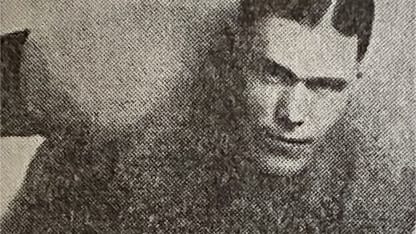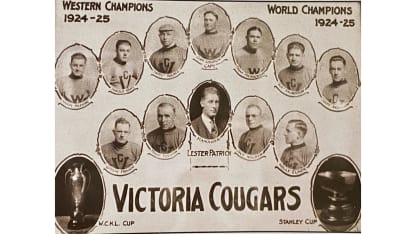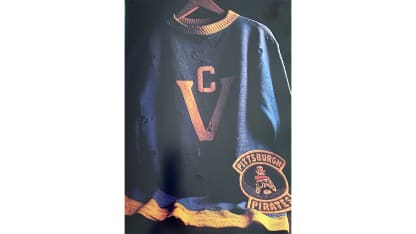Legendary hockey reporter and analyst, Stan Fischler, writes a weekly scrapbook for NHL.com. Fischler, known as The Hockey Maven, will share his knowledge, brand of humor and insights with readers each week.
Today, his "Voices From The Past" segment features Hockey Hall of Famer Frank Fredrickson, a Winnipeg native who fought in World War I before winning the Stanley Cup as a forward with the Victoria Cougars and playing in the early years of the NHL. Stan and his wife, Shirley, interviewed Fredrickson in 1970 at Frank's Vancouver apartment.
Fredrickson was war hero, Stanley Cup winner, Hockey Hall of Famer
Forward excelled on last non-NHL championship team

By
Stan Fischler
Special to NHL.com
How and when did hockey enter your life?
"I got my first pair of skates when I was 5 years old and had a great time learning to play. When my dad came home from work he pumped water into our backyard and after a while it froze and we'd have a little rink, about 15 by 20 feet. Then my father and some friends built a big community rink with shacks, pot-bellied stoves and everything else we'd need to be comfortable. Funny thing is that my eighth-grade teacher, Miss McLeod, actually used to come out on Saturdays and play hockey with us. I wasn't such a good player at the time; my hockey break came later after I quit school."
When did you improve as a player?
"After finishing eighth grade, I decided I ought to earn a living and got a job as an office boy in a Winnipeg law firm. In those days the firms sponsored hockey teams, so naturally we had one but at first I wasn't good enough to make the roster. Then I got a lucky break. The club was a man short and they asked the senior office boy to play but he couldn't on account of a bum leg. Then they tried another boy who had a different excuse and that brought them finally to me. They put me in and I played well enough to capture the attention of two of our attorneys who figured I could still play hockey but also should study as well. They urged me to go back to school, so in 1914 I enrolled at the University of Manitoba and made the hockey team. After a year I was playing so well I was named team captain. But then hockey had to stop for me because there was a war on."
What happened?
"I was supposed to gradute in 1918 except that World War I was on and a lot of my chums were joining the 196th University Battalion. I felt a duty to go along, so I joined up but before they sent me overseas I switched to the 223rd Scandinavian Battalion. When I got to the other side, I joined the Air Force, which was really a laugh. In those days, the planes were more like box kites. I trained in Egypt and then got transferred to Italy. But before -- and during -- the boat trip to Italy, across the Mediterranean any hopes of my resuming my hockey career after the war nearly ended. Our ship was torpedoed, and just when I thought all was lost, I found a canvas lifeboat and scrambled in with some other fellows. A Japanese destroyer came right at us, but it swerved in the nick of time, came alongside us and brought us aboard. After the torpedoing, I finally made it to Italy; then from there I was sent to England and finally Scotland. I wanted to get on a plane called the SC-5 because I heard it was a marvelous warplane, but they gave me orders to be an instructor and I stayed with that role until the war ended. It took me a year to get out of the armed forces and return to Winnipeg and resume my hockey career."
Who lured you back to hockey?
"A fellow named Mike Goodman, who had been the speed-skating champion of North America and loved hockey. Mike organized the Winnipeg Falcons hockey team along with Slim Halter, who was a beautiful stickhandler. Mike applied for admission to the senior league but they wouldn't let us in, claiming we weren't good enough. (Later we found out that they turned us down because they were from well-to-do families and wanted no part of us poorer fellows.) So we did the next best thing and formed a league of our own. One of the teams we brought in was from Selkirk and they had 'Bullet' Joe Simpson as captain. Simpson later made it to the NHL and the Hockey Hall of Fame. That showed that we had good competition in our new league."
How good were your Winnipeg Falcons?
"Those senior league guys who wouldn't let us in their league eventually got their comeuppance from us. We finished first in our league and then played them in a two-game series. We beat them 14-2 in the two games! We got to the Final for the Allan Cup, the senior championship of Canada. We went to Toronto and beat the famed University of Toronto team and won the Allan Cup, which qualified us to represent Canada in the 1920 Winter Olympics at Antwerp, Belgium. This was the first time ice hockey was included on the Olympic program, so it was quite a big deal for our guys from Winnipeg. We won the Olympic championship, which was quite a feather in our cap and gave us a lot of publicity."
What did you do about all the attention?
"I had the world at my feet but instead of returning immediately to Canada, I was asked instead by the Icelandic government to go there. In Iceland, they had heard about my flying exploits so they asked me to do some experimental flying. As it happened, I became the first pilot of Icelandic extraction to fly in Iceland. I flew from May to September and then had to give it up because they ran out of (fuel). I eventually made my way back to Canada and in 1920 I joined the Canadian air force and figured that my career as a pilot was set for years to come. But funny things happen in life, and out of the blue I got a letter that changed my career."
How did that happen?
"The letter was from Lester Patrick. He was in Victoria, British Columbia, where he had a team, the Cougars, in the old Pacific Coast Hockey Association, a top-notch outfit that was right on a par with the NHL which still was young. Lester offered me what was a substantial contract in those days -- $2,400 for 24 games. I call it 'substantial' because the rest of the boys were playing for $800 and $900. I couldn't resist the offer and found myself right back in the middle of hockey again. Lester was taking a gamble on my reputation and the fact that I had played on the Canadian Olympic team. But he believed in me and went around telling people that I was the highest-paid player in the Pacific Coast league."
What was it like winning the Stanley Cup with Victoria?
"In 1925, we went all the way to the Stanley Cup Final against the Montreal Canadiens. They were the defending champions and had Hall of Famers such as
Georges Vezina
in goal and
Sprague Cleghorn
, along with his brother,
Odie
, as well as a young
Howie Morenz
. The best-of-5 series was played out west and created terrific interest. The only problem was that our home rink in Victoria could hold only about 4,500 people. The Vancouver rink held about 11,500, which then was the largest seating capacity in the world for hockey. Because of the keen interest in the series the powers that be decided to hold one of the games in the huge Vancouver arena. Excitement was so intense that people came the night before the game and built fires to keep warm until the ticket (windows) opened. We won the first game in Victoria 5-2, and then Game 2 was held at the big Vancouver rink. Didn't matter to us because we came out on top again, this time 3-1. They finally beat us in the third game, 4-2, but we made sure that wouldn't happen again and finished with a 6-1 decision and won the Stanley Cup. The city of Victoria was ours; the people simply gave us everything we wanted."
How did you wind up in the NHL?
"The season after we won the Stanley Cup we went to the Cup Final again, but this time the Montreal Maroons beat us. Meanwhile, the NHL was expanding into the United States, where there were big, new arenas going up, like Madison Square Garden in New York City. Our Pacific Coast League was different from the NHL in the sense that we were at a big disadvantage -- except for Vancouver -- in terms of our smaller rinks and the less amount of money our teams could pay compared to the big money in the East. The Pacific Coast League eventually disbanded and Lester sold most of his players to the NHL, especially the new Detroit team. All of the Cougars players went to Detroit, except me. Art Ross, who was running the new Boston Bruins club, wanted me to play alongside
Eddie Shore
and
Harry Oliver
. I refused to sign with the Bruins and Ross threatened to have me expelled for life. Rather than deal with Ross, I decided to follow my Victoria teammates. I signed with Detroit and got $6,000, which was a lot of money at the time."

How much success did you have in Detroit?
"Things turned out badly. Until I went there, I had always been among the team leaders in scoring. With Detroit, I was nowhere close to the top. Another issue was the leadership and lack of camaraderie on the new club. We had dissension on the team and, frankly, I couldn't get out of there fast enough. Fortunately, Art Ross went after me again; this time he worked a trade that got me to Boston. He said he was putting me on the first line with Harry Oliver and
Perk Galbraith
, a pair of pretty darn good players. The Bruins were second-to-last in the NHL's American Division at the time, and it was pretty evident that Art wanted me to help put the Bruins in the upper echelon. I did my best, and pretty soon the team was on the rise. Matter of fact, in due time we wound up taking the lead. It was due to teamwork; the fellows were working together in a collective effort. It taught me a lesson; by cooperation and joint effort, you can do an awful lot more than when you just try to do things by yourself."
How did you feel about Ross?
"He was tough, hated to lose and could be hard on referees. Very hard. The incident I'll never forget took place during the 1927 Stanley Cup Final against the Ottawa Senators. We lost the last game, and the Cup, 3-1 -- and there was a lot of unhappiness on our side over the refereeing of Jerry Laflamme. Ross, especially, vehemently objected to some 'bad calls' the referee had made and after the game was over Ross got us together in the dressing room and said, 'OK, the first man who gets that referee gets a $500 bonus.' We had a big boy on our team,
Billy Coutu
, and the minute he saw Laflamme he let him have it, unmercifully, and knocked him out. Ross gave him the $500 bonus, but Coutu was suspended for life (by the NHL), yet it was Ross who inspired the whole fracas, and I've never forgiven Ross for that."
What happened after that?
"Not long after that incident a story ran in the Boston Herald saying that Frank Fredrickson would be handling the Boston club. It was a ridiculous story and I had no idea why it was written; but it ran and did me much harm. Naturally, Ross didn't like it and when we got to New York for a game, he took me off my regular line. After that, he used me less and less. Finally, he went to our owner, Charles Adams, and suggested I be traded to the Pittsburgh Pirates, which was a huge downer for me."

How did you handle it?
"Of course, I didn't want to leave Boston; I loved living there and my family had settled in and loved it as well. I knew that ownership wasn't crazy about my leaving either because our owner, Mr. Adams, called me into his office and said, 'Frank, I'm awfully sorry, but I more or less have to take the advice of my manager, and that's that.' Then, he handed me a check for $1.000, which was wonderful of him. I heard a lot from my fans and teammates who were very unhappy about my having to leave. But I had to make do and packed my bags and moved on to Pittsburgh."
What happened then?
"The club was run by Odie Cleghorn, who was a character in his own right. I had nothing against Odie, but, for me, Pittsburgh was the beginning of the end -- and it also was where I got double-crossed. I had a three-year contract at $8,000 a year, but my first season was a poor one and I ended up tearing the cartilage in my knee. I was 37, old by hockey standards, and they decided to cut my contract. Meanwhile, we were in the midst of the Great Depression, lots of people were out of work and the Pirates weren't doing well -- the team was moved to Philadelphia in 1930. If it had been a different era -- like now (1970) for instance, and they had dropped me the way they did -- I would have sued them. Instead, what I did was meet with my old boss, Lester Patrick, who I always had trusted. I told Lester what had happened and that I wanted to sue. He replied, 'It would cost you more to sue in the courts than to get them to make good on your contract.' I thought about what he said and figured Lester was right. That was it for the NHL and me."

















